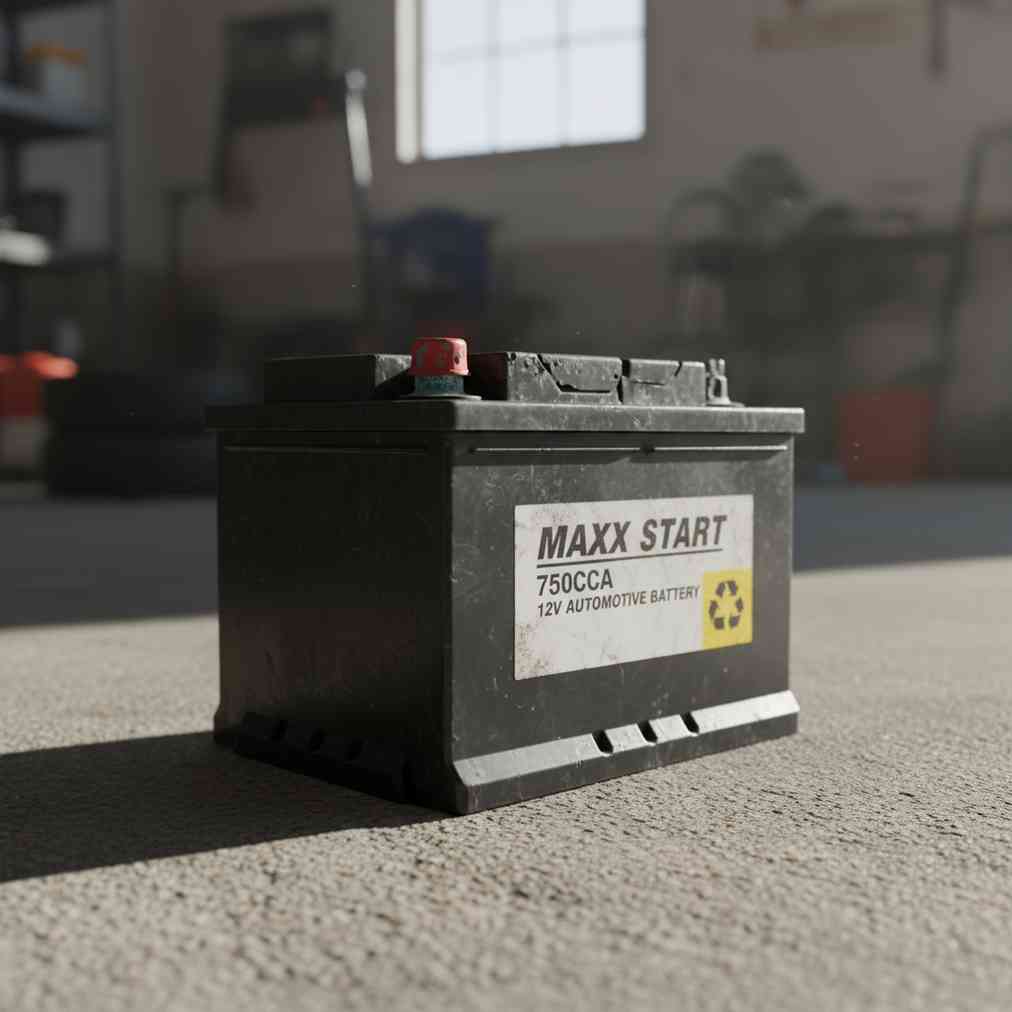Understanding Used Car Batteries: The Basics
When your car battery dies, the decision between buying new or used can significantly impact both your wallet and vehicle reliability. Used car batteries come in two main categories: non-refurbished batteries that are simply removed from vehicles and resold, and refurbished batteries that undergo restoration processes including terminal cleaning, electrolyte replacement, and recharging.
A refurbished car battery is an older battery that has been restored through professional processes like de-sulfation, cleaning terminals, refilling electrolyte fluid, and replacing damaged parts. While this sounds promising, the reality is that these batteries still carry inherent risks that buyers must carefully consider.
The Financial Reality: Cost vs. Value Analysis
Used batteries typically cost 50-75% less than new ones, making them attractive for budget-conscious consumers. According to industry experts, a reasonable price point for used batteries ranges from $30-$40, compared to $60-$130 for new batteries. However, this upfront savings comes with trade-offs that extend beyond the initial purchase price.
When considering the total cost of ownership, Interstate Batteries warns that refurbished batteries often can’t withstand prolonged wear and tear, potentially leading to premature failure and additional replacement costs.
Comprehensive Pros and Cons Analysis
| Advantages | Disadvantages |
|---|---|
| Significant cost savings (50-75% less) | Reduced lifespan between charges |
| Immediate availability at salvage yards | Higher risk of unexpected failure |
| Good temporary solution | Limited or no warranty coverage |
| Environmentally friendly option | Variable quality and reliability |
| Easier to find for vintage vehicles | Potential safety hazards from damaged casings |
The environmental benefits of choosing used batteries shouldn’t be overlooked. Battery recycling and refurbishment help reduce electronic waste and keep lead and other metals out of landfills while reducing raw material mining needs.
Expected Lifespan: Setting Realistic Expectations
Understanding battery lifespan is crucial for making an informed decision. Here’s what you can realistically expect:
- New batteries: Typically last 3-5 years with proper maintenance
- Refurbished batteries: Generally last 6 months to 2 years after restoration
- Student budget estimate: A cheap used battery lasting 18-24 months was historically considered acceptable
- Professional refurbished: May last several years depending on initial condition and refurbishment quality
The key factor determining lifespan is the quality of the refurbishing process and the battery’s condition before restoration. Professional refurbishers who offer warranties typically provide more reliable products than individual sellers.
Essential Testing: How to Evaluate a Used Battery
Before purchasing any used battery, proper testing is non-negotiable. FQS Battery emphasizes that buying non-tested batteries is extremely risky without guarantees or warranties.
Voltage Testing Procedure
- Preparation: Turn off ignition and all accessories, allow battery to rest for at least one hour
- Multimeter setup: Set device to 20V DC (Direct Current Voltage)
- Connection: Red probe to positive (+) terminal, black probe to negative (-) terminal
- Reading interpretation:
- 12.6 volts or higher = healthy, fully charged
- 12.4 volts = may need charging
- 12.2 volts = discharged, only 50% charged
- Cranking test: Voltage shouldn’t drop below 10 volts during 15-second engine crank
Advanced Testing Methods
While voltage testing provides basic information, conductance testing offers more reliable results. This specialized test measures the battery’s ability to deliver current and requires professional equipment found at auto parts stores or dealerships. Even batteries passing these tests can fail prematurely, but they offer better buying indicators than voltage alone.
Visual Inspection: Identifying Red Flags
Physical condition often correlates directly with performance reliability. Professional inspection should include these critical areas:
Corrosion Signs and Implications
- Appearance: Crumbly, ashy residue in white, blue, or green colors
- Common locations: Battery terminals and cable connection points
- Positive terminal corrosion: Indicates overcharging, often from faulty alternator
- Negative terminal corrosion: Suggests undercharging from short trips or high accessory use
- Performance impact: Acts as barrier to current flow, causing slow starts and electrical issues
Other Critical Inspection Points
- Case condition: Look for cracks, bulges, or signs of leakage
- Manufacturing date: Batteries older than 3-4 years are nearing end of life
- Terminal condition: Check for damage or excessive wear
- Electrolyte levels: Should be visible and adequate in serviceable batteries
Where to Buy: Navigating Your Options
The source of your used battery significantly impacts both quality and reliability. Salvage yards near me often provide immediate access to used batteries, but professional auto parts retailers may offer better-tested options with limited warranties.
UPI Auto Parts recommends purchasing from reputable dealers who test batteries before sale and offer some form of guarantee. This approach provides better protection than buying from unknown sellers or unregulated sources.
“Always test a used or reconditioned battery before purchase and preferably buy from reputable vendors who offer some form of warranty or guarantee.”
Industry Battery Experts
Special Considerations and Risk Factors
Several factors can significantly impact used battery performance and safety:
Idle Time Impact
Batteries require occasional charging from vehicle operation. Extended idle periods, especially in hot climates, can severely weaken battery capacity. This is particularly relevant for batteries from salvage yards where vehicles may sit for extended periods.
Climate Considerations
Extreme temperatures affect battery life and performance. Used batteries may be more susceptible to temperature-related failures, making climate a crucial factor in the purchase decision.
Vehicle Compatibility
Modern vehicles with advanced electrical systems may be less forgiving of battery inconsistencies. Consumer Reports emphasizes the importance of reliable power sources, especially for vehicles with complex electrical demands.
Expert Recommendations and Best Practices
Industry professionals consistently provide similar guidance for used battery purchases:
- Price threshold: Only consider used batteries priced low enough to justify potential short lifespan
- Professional testing: Always have conductance testing performed before purchase
- Warranty preference: Choose sellers offering even limited warranties over private sales
- Emergency use: Consider used batteries primarily for temporary solutions or low-use vehicles
- Safety first: Avoid batteries with visible damage or from questionable sources
Environmental Impact and Sustainability
The environmental argument for used batteries continues strengthening as sustainability awareness grows. Proper battery refurbishment and recycling reduce mining demands and prevent hazardous materials from entering landfills. However, environmental benefits must be balanced against potential safety risks from improper recycling practices.
Choosing certified refurbishers and recyclers ensures both environmental benefits and safety standards are maintained.
Making the Final Decision: When Used Batteries Make Sense
Used car batteries can be worthwhile under specific circumstances:
- Budget constraints: When immediate transportation needs outweigh long-term reliability concerns
- Temporary solutions: Bridge option while saving for new battery purchase
- Low-use vehicles: Seasonal or occasional-use vehicles with minimal electrical demands
- Vintage applications: When new batteries are unavailable or extremely expensive
- Emergency situations: Immediate replacement needs with limited alternatives
However, avoid used batteries for daily drivers, vehicles with high electrical demands, or situations where reliability is paramount.
Final Verdict: Are Used Car Batteries Worth It?
Used car batteries can provide value under the right circumstances, but they require careful evaluation and realistic expectations. The initial cost savings must be weighed against potential reliability issues, shorter lifespan, and possible safety concerns.
For buyers prioritizing maximum reliability and longevity, new batteries remain the better choice. However, for budget-conscious consumers with appropriate use cases, properly tested used batteries from reputable sources can offer acceptable temporary solutions.
If you’re considering selling your current vehicle to avoid battery replacement costs altogether, you can get an instant quote for your junk car to explore your options.
The key to success with used batteries lies in thorough testing, realistic expectations, and purchasing from reputable sources that stand behind their products with at least minimal warranties. When these conditions are met, used batteries can serve as cost-effective solutions for appropriate applications.





Leave a Reply
You must be logged in to post a comment.